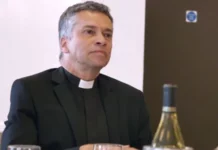Haitian Episcopalians have spent the hours since the Aug. 14 7.2 magnitude earthquake searching for family and friends while assessing the damage to their churches, schools and communities as their ministry partners across The Episcopal Church have anxiously awaited their news.
The death toll from the earthquake stood at close to 1,300 the evening of Aug. 15, Haiti’s Civil Protection Agency said via Twitter. Amid the devastation, Tropical Storm Grace, now downgraded to a tropical depression, was expected to bring heavy rainfall over the island on Aug. 16, potentially causing flash flooding and mudslides into Aug.17.
After the quake “the streets are filled with screaming,” the Rev. Abiade Lozama, archdeacon at Saint Sauveur Episcopal Church in Les Cayes near the quake’s epicenter, told the New York Times Aug. 14. “People are searching, for loved ones or resources, medical help, water.”
He and others were welcoming teachers and parents on Saturday morning to discuss plans to return to school when the earthquake occurred. Everyone ran outside, looking for an open space free of trees or buildings that could collapse. Lozama said he walked from the school to the town center and saw only a handful of houses that did not have damage.
The quake struck at 8:29 a.m. Eastern time 5 miles from the town of Petit Trou de Nippes on the country’s southwest peninsula, and 78 miles west of the Haitian capital of Port-au-Prince. Shocks were felt as far away as 200 miles in Jamaica, according to the United States Geological Survey.
“People are sitting around waiting for word, and there is no word — no word from their family, no word on who will help them,” Lozama told the Times. “When such a catastrophe happens, people wait for word or some sort of confidence from the state. But there’s nothing. No help.”
“We know that lives have been lost and many buildings destroyed,” Elizabeth Lowell, a member of the board of St. Vincent’s Center for Children with Disabilities in Haiti, wrote to supporters on Aug. 14. “Episcopal clergy in the affected area are safe, but shaken.”
Among those shaken clergy members, Lowell told Episcopal News Service, is the Rev. Kesner Ajax, known to many Episcopal congregations and schools as the coordinator of partnership efforts between the Diocese of Haiti and Episcopalians elsewhere in the church. Ajax lives in Les Cayes. ENS received an email from him on Aug. 15 promising details of his experience as soon as possible.
The Episcopal Diocese of Haiti is numerically the church’s largest, with 92,651 members as of 2019, the latest year for which parochial report statistics are available. The diocese grew nearly 11% between 2009 and 2019.
Episcopalians are preparing to help in Haiti as best they can.
“We are deeply saddened by the reports coming from our friends and partners in Haiti,” Abagail Nelson, executive vice president of Episcopal Relief & Development, said in a statement posted on the organization’s website. “We pray for their safety as Tropical Storm Grace approaches the country. We are currently mobilizing to work with an array of development partners to meet the immediate and long-term needs of affected communities.”


